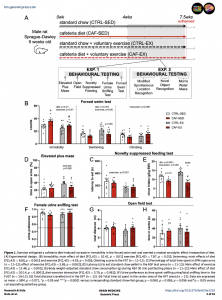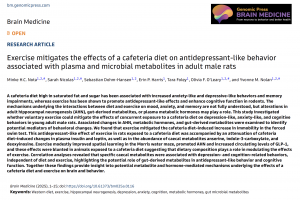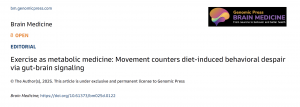Exercise counteracts junk food's depression-like effects through gut-brain metabolic signaling

The metabolic tug-of-war: Exercise versus ultra-processed diet. Voluntary exercise exerts an antidepressant-like behavioral effect and attenuates metabolic dysregulation in rats fed a cafeteria diet.

Exercise mitigated a cafeteria diet–induced increase in immobility in the forced swim test and exerted a modest anxiolytic effect irrespective of diet.
Researchers reveal how running mitigates cafeteria diet-induced behavioral changes in rats. The findings identify mechanisms linking lifestyle to mental health
The findings provide crucial insights into how lifestyle interventions might be optimized to support mental health in an era of widespread ultra-processed food consumption.
The research team exposed adult male rats to either standard chow or a rotating cafeteria diet consisting of various high-fat and high-sugar foods for seven and a half weeks, with half of each dietary group having access to running wheels. This experimental design allowed researchers to isolate the independent and combined effects of diet quality and physical activity on brain function and behavior.
Of importance, this study reveals novel mechanisms linking exercise to mood regulation. The study revealed that voluntary wheel running exerted an antidepressant-like behavioral effect in the context of poor diet quality, suggesting that physical activity may be beneficial for individuals consuming Western-style diets.
Professor Nolan and colleagues employed untargeted metabolomics to analyze caecal contents, revealing that the cafeteria diet dramatically altered the gut metabolome, affecting 100 out of 175 measured metabolites in sedentary animals. Exercise showed more selective effects, modulating only a subset of these changes. Three metabolites previously linked to mood regulation stood out for their response pattern: anserine, indole-3-carboxylate, and deoxyinosine were all decreased by the cafeteria diet but partially restored by exercise.
The research utilized comprehensive behavioral testing batteries to assess multiple domains of brain function. While the cafeteria diet alone did not significantly impair spatial learning or recognition memory in these adult rats, exercise produced modest improvements in spatial navigation. The team also examined anxiety-like behaviors, finding subtle anxiolytic effects of exercise independent of dietary composition.
Hormonal pathways mediate diet-exercise interactions: Plasma hormone analysis revealed striking metabolic changes that paralleled the behavioral findings. The cafeteria diet substantially elevated insulin and leptin concentrations in sedentary animals, changes that were significantly attenuated by exercise. Dr. Minke Nota, first author of the study, notes that these hormonal normalizations likely contributed to the protective effects of exercise against diet-induced behavioral changes.
The research also uncovered complex interactions between diet and exercise on other metabolic hormones. Exercise increased circulating glucagon-like peptide 1 (GLP-1) levels in standard chow-fed animals, but this effect was blunted by the cafeteria diet. Conversely, exercise elevated peptide YY (PYY) levels specifically in cafeteria diet-fed rats, suggesting compensatory mechanisms that may help maintain metabolic homeostasis under dietary challenge.
Fibroblast growth factor 21 (FGF-21) showed robust increases in response to the cafeteria diet regardless of exercise status, while glucagon levels decreased with the dietary intervention. These multifaceted hormonal changes highlight the complex endocrine responses to lifestyle factors and their potential roles in mediating effects on brain function.
Implications for understanding diet-brain relationships: Perhaps most intriguingly, the study found that the cafeteria diet prevented the typical exercise-induced increase in adult hippocampal neurogenesis (formation of new neurons), as measured by doublecortin-positive cells in the dentate gyrus. In standard chow-fed animals, exercise robustly increased neurogenesis throughout the hippocampus, a brain region involved in emotion and memory. This finding suggests that diet quality may fundamentally alter the brain's capacity to benefit from physical activity at the cellular level.
The research team conducted correlation analyses to identify relationships between specific metabolites and behavioral outcomes. Several caecal metabolites including aminoadipic acid and 5-hydroxyindole-3-acetic acid showed negative associations with cognitive performance. These correlations were independent of experimental condition, suggesting fundamental relationships between gut metabolite profiles and brain function.
An accompanying editorial by Dr. Julio Licinio (USA), Dr. Ma-Li Wong (USA), and Dr. Nicholas Fabiano (Canada) emphasizes the clinical relevance of these findings, noting that "exercise has an antidepressant-like effect in the wrong dietary context, which is good news for those who have trouble changing their diet." The editorial highlights how this research provides a biological framework for understanding why exercise remains beneficial even when dietary improvements prove challenging to implement.
What are the future directions and clinical translation to humans? The study raises important questions about optimal sequencing of lifestyle interventions. The findings suggest that while exercise can provide mood benefits regardless of diet quality, achieving full neuroplastic benefits may require attention to nutritional status. This has implications for designing interventions that maximize both feasibility and biological impact.
Several limitations warrant consideration. The study was conducted exclusively in male rats, and sex differences in metabolic and neurogenic responses to diet and exercise are well-documented. Additionally, the seven-week intervention period may not capture longer-term adaptations that could emerge with chronic exposure. Future studies incorporating female animals, longer intervention periods, and dose-response designs will help refine understanding of these complex interactions.
The research also opens new avenues for investigating specific metabolites as potential therapeutic targets. The protective effects of exercise on anserine, indole-3-carboxylate, and deoxyinosine levels suggest these compounds may serve as biomarkers or even therapeutic agents for mood disorders. The strong correlations between specific gut metabolites and behavioral measures support growing interest in the microbiota-gut-brain axis as a target for mental health interventions.
This peer-reviewed research represents a significant advance in understanding the biological mechanisms linking diet, exercise, and mental health, offering new insights into how lifestyle factors interact at molecular and cellular levels to influence brain function. The findings challenge existing paradigms about the relationship between metabolic and mental health by demonstrating that exercise can provide antidepressant-like effects even in the context of poor dietary choices. By employing innovative metabolomic approaches combined with comprehensive behavioral and neurobiological assessments, the research team has generated data that not only advances fundamental knowledge but also suggests practical applications for addressing the mental health challenges associated with modern dietary patterns. The reproducibility and validation of these findings through the peer-review process ensures their reliability and positions them as a foundation for future investigations. This work exemplifies how cutting-edge research can bridge the gap between basic science and translational applications, potentially impacting individuals struggling with mood disorders in the coming years.
The Research Article in Brain Medicine titled "Exercise mitigates the effects of a cafeteria diet on antidepressant-like behaviour associated with plasma and microbial metabolites in adult male rats," is freely available via Open Access on 21 October 2025 in Brain Medicine at the following hyperlink: https://doi.org/10.61373/bm025a.0116.
The accompanying Editorial in Brain Medicine titled "Exercise as metabolic medicine: Movement counters diet-induced behavioral despair via gut-brain signaling," is also freely available via Open Access on 21 October 2025 in Brain Medicine at the following hyperlink: https://doi.org/10.61373/bm025d.0122.
About Brain Medicine: Brain Medicine (ISSN: 2997-2639, online and 2997-2647, print) is a peer-reviewed medical research journal published by Genomic Press, New York. Brain Medicine is a new home for the cross-disciplinary pathway from innovation in fundamental neuroscience to translational initiatives in brain medicine. The journal's scope includes the underlying science, causes, outcomes, treatments, and societal impact of brain disorders, across all clinical disciplines and their interface.
Visit the Genomic Press Virtual Library: https://issues.genomicpress.com/bookcase/gtvov/
The Genomic Press full website is at: https://genomicpress.kglmeridian.com/
Research Contact: For research questions related to this article please reach Professor Yvonne M. Nolan, Department of Anatomy and Neuroscience, Western Gateway Building, University College Cork, Ireland. E-mail: y.nolan@ucc.ie - website: https://research.ucc.ie/profiles/y.nolan@ucc.ie
Ma-Li Wong
Genomic Press
mali.wong@genomicpress.com
Legal Disclaimer:
EIN Presswire provides this news content "as is" without warranty of any kind. We do not accept any responsibility or liability for the accuracy, content, images, videos, licenses, completeness, legality, or reliability of the information contained in this article. If you have any complaints or copyright issues related to this article, kindly contact the author above.


